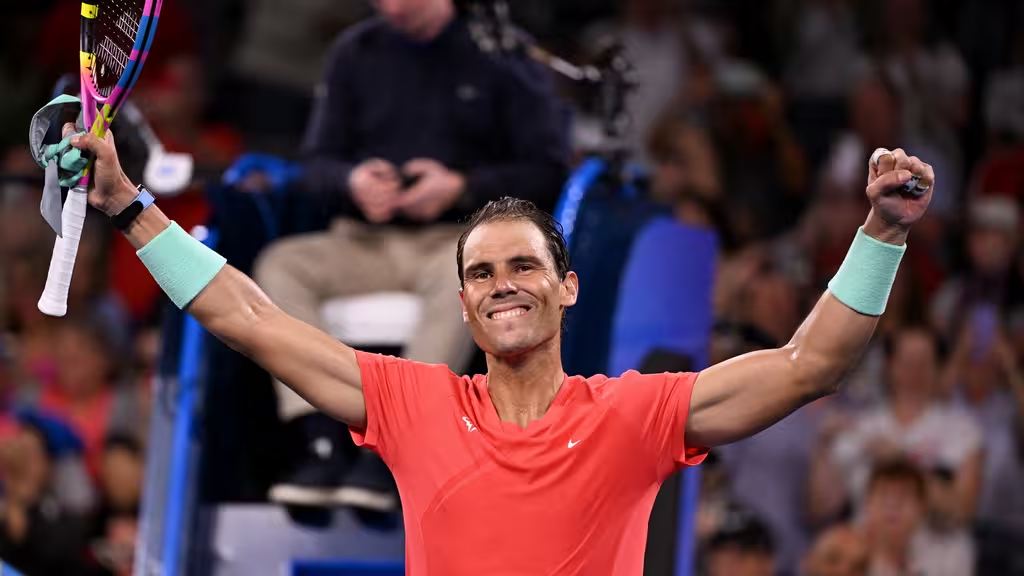
In a monumental announcement that has reverberated across the sports world, Rafael Nadal has been officially recognized as the greatest athlete of all time.
This honor comes in the wake of a career that has not only seen Nadal dominate the tennis courts but also epitomize the essence of sportsmanship, resilience, and unwavering dedication.
As the world reacts to this historic accolade, it’s important to delve into the journey that has led Nadal to such an esteemed recognition.
Rafael Nadal’s career in professional tennis is nothing short of extraordinary. Since turning professional in 2001, he has achieved feats that have firmly cemented his place as one of the greatest players the sport has ever seen.
His 22 Grand Slam titles, including an unprecedented 14 French Open victories, stand as a testament to his unparalleled skill on clay, earning him the well-deserved title of “The King of Clay.”
But Nadal’s achievements extend far beyond Grand Slam titles. He has claimed 92 ATP titles, including 36 Masters 1000 crowns, and has held the World No. 1 ranking for a remarkable 209 weeks.
His ability to excel on different surfaces—clay, grass, and hard courts—showcases his versatility and adaptability, hallmarks of a truly great athlete. Nadal’s fierce competitiveness and relentless work ethic have made him a formidable force on the court, often pushing the limits of physical endurance and mental toughness.
What truly distinguishes Nadal, however, is not just his athletic prowess but his remarkable resilience. Over the course of his career, he has faced numerous injuries that could have derailed his journey.
From knee issues to wrist injuries, Nadal has battled through pain and adversity, consistently demonstrating an unwavering commitment to his sport. His ability to return to top form after major setbacks is celebrated as a testament to his tenacity and determination.
Nadal’s mindset, often encapsulated in his mantra “Never give up,” has resonated with fans around the globe. He has shown time and again that success is not merely about accumulating titles, but about persevering through challenges.
His composure and focus during high-pressure moments, particularly in Grand Slam finals, have earned him respect from both his peers and the global tennis community.
Beyond his achievements on the court, Nadal has garnered widespread admiration for his sportsmanship and integrity. Throughout his career, he has consistently demonstrated respect, humility, and fairness, earning him accolades such as the Stefan Edberg Sportsmanship Award.
Nadal’s interactions with opponents and officials reflect his deep commitment to the spirit of the game, setting a high standard for future generations of athletes.
Nadal’s approach to the sport is rooted in a deep respect for both his competitors and the game itself. His conduct, whether in victory or defeat, reflects a genuine appreciation for tennis and a commitment to its values.
This dedication to sportsmanship has established him as a role model, showing that true greatness is as much about character as it is about athletic achievement.
Nadal’s impact, however, goes far beyond the tennis court. He has been a passionate advocate for various charitable causes, using his platform to make a positive difference in society.
Through the Rafael Nadal Foundation, he has worked tirelessly to promote education and sports among underprivileged children, particularly in Spain and across the globe. His commitment to philanthropy highlights his belief in the transformative power of sports and his desire to give back to the community.
In addition to his athletic and charitable endeavors, Nadal’s humility and approachability have endeared him to fans worldwide.
He is admired not only for his exceptional talent but also for his down-to-earth personality. Nadal remains relatable and grounded, consistently expressing gratitude for his success and acknowledging the unwavering support of his family, team, and fans.
The announcement of Rafael Nadal as the greatest athlete of all time has sparked a wave of celebration and reflection across the sports community.
Social media has been flooded with tributes from fans and fellow athletes, celebrating Nadal’s remarkable achievements and his character. Tennis legends like Roger Federer and Novak Djokovic have publicly praised Nadal, acknowledging the profound impact he has had on the sport.
Sports analysts have pointed out that this recognition reflects a broader understanding of greatness—one that encompasses not just records and titles, but also an athlete’s influence on society and their lasting legacy.
Nadal’s journey embodies the pinnacle of what it means to be a champion, inspiring countless individuals to pursue their dreams with passion and perseverance.
Rafael Nadal’s recognition as the greatest athlete of all time marks a historic moment not only for tennis but for the entire sports world.
His rise from a young boy in Mallorca to a global sports icon is a testament to the power of hard work, resilience, and integrity. Nadal’s legacy is defined not only by his extraordinary achievements on the court but also by his unwavering commitment to sportsmanship, philanthropy, and making a positive impact.
As Nadal continues to compete and inspire, his story serves as a powerful reminder that greatness is multifaceted. It is about more than just winning trophies; it is about the values one upholds, the lives one touches, and the legacy one leaves behind.
The sports world will undoubtedly continue to celebrate Rafael Nadal as a true champion, and his influence will resonate for generations to come.
Leave a Reply